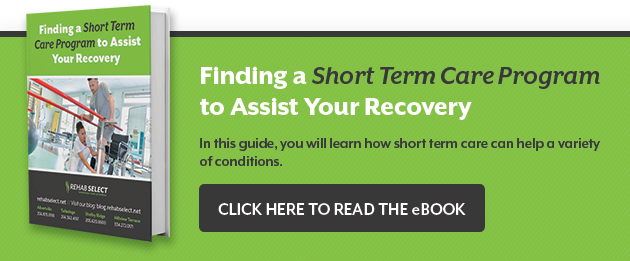 Many patients who have been recommended short term rehab after a serious surgical procedure are reluctant to follow that advice, even after hearing its reasons – safer, faster, and more complete recoveries as compared to outpatient or home-based rehabilitation services – explained in detail. So why the reluctance? Often it is rooted in common misconceptions about inpatient rehab. Here we'll outline some of the most common misconceptions that may discourage patients from seeking the most effective and efficient rehabilitative treatment after surgery.
Many patients who have been recommended short term rehab after a serious surgical procedure are reluctant to follow that advice, even after hearing its reasons – safer, faster, and more complete recoveries as compared to outpatient or home-based rehabilitation services – explained in detail. So why the reluctance? Often it is rooted in common misconceptions about inpatient rehab. Here we'll outline some of the most common misconceptions that may discourage patients from seeking the most effective and efficient rehabilitative treatment after surgery.
Misconception: Short Term Rehab is Just Physical Therapy
Fact: Inpatient physical rehabilitation programs are not simply the same therapy offered at your local outpatient PT clinic. While physical therapy is definitely an important component of rehabilitation, inpatient programs offer much more. Patients who attend an inpatient rehab program can expect to be treated with a comprehensive and personalized treatment plan, formulated by a multidisciplinary team of rehabilitation experts and designed to provide the care they need to make the most of their recovery. Depending upon the personal needs of each patient, services may include treatment by rehab professionals that include physical and occupational therapists, nutritionists, neuropsychologists, respiratory therapists, counselors, social workers, and case managers, among others, along with 24 hour care provided by nurses and physicians who specialize in rehabilitative medicine.
Misconception: Inpatient Rehab is Just Like Going to a Nursing Home
Fact: Short term inpatient rehabilitation programs are very different from long-term skilled nursing care, both in terms of the type of care patients can expect and the goals of that treatment. While both types of programs offer comprehensive, 24 hour care in a hospital-type atmosphere, the similarity generally ends there – even when rehabilitation programs are based within a skilled nursing center. The goal of short term rehab is to get patients on their feet – strong, stable and healthy. In short, long-term placement is not the plan. Rather, these programs are geared towards helping patients make their best recoveries from surgery, getting them back to their normal, everyday, independent lives as quickly as possible.
Misconception: Inpatient Rehab Means Giving Up Control of Your Health and Recovery
Fact: While you'll certainly have a great deal of expert advice and assistance as you rehabilitate after surgery, you will remain firmly in control of your own health and recovery. Rehabilitation planning and treatment is not, by any means, a passive process on the part of the patient. Rather, patients are not only welcome, but expected to take an active role in the planning of their individualized rehabilitation program, and are most certainly active participants in day-to-day therapy and treatment.
While these are some of the most common misconceptions about short term rehab, there's a lot more misinformation on these programs floating about. For that reason, it is important to make sure that your information on your rehabilitation options comes from professional sources such as your health care team or your local rehabilitation hospital. That way you won't discount options that might benefit you due to poor information. So don't be afraid to reach out for the information you need to make solid, well-informed and accurate decisions about your care as you recover and rehabilitate after surgery.





